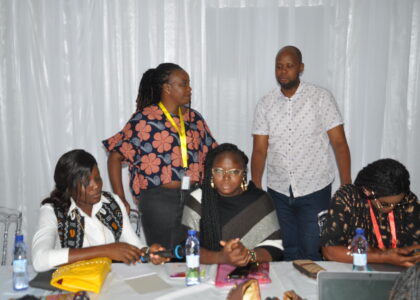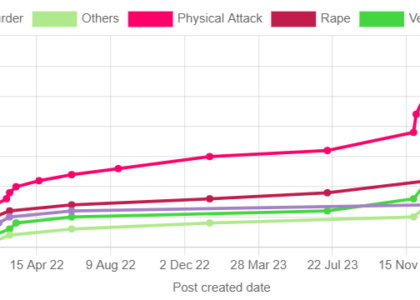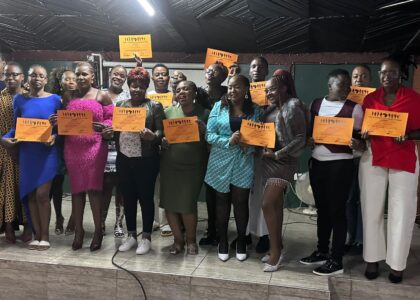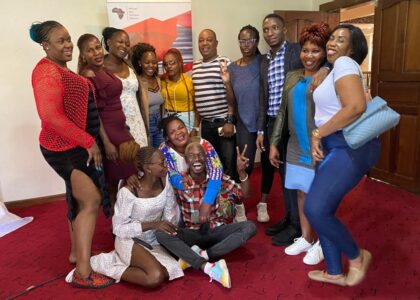 ALESWA is informed by the emerging needs to expand sex workers skills and knowledge to build a strong and resilient movement in Africa that is able to cope with the changing dynamics of work occasioned by the emergency of COVID 19 and other challenges.
ALESWA is informed by the emerging needs to expand sex workers skills and knowledge to build a strong and resilient movement in Africa that is able to cope with the changing dynamics of work occasioned by the emergency of COVID 19 and other challenges. From the milestones, ASWA’s objective with ALESWA is to strengthen the capacity of emerging and existing sex workers leaders to create a robust sex workers movement in Africa. ALESWA is an extensive knowledge and skills building training model to build the resilience of individuals and organizations in the next three years.
From the milestones, ASWA’s objective with ALESWA is to strengthen the capacity of emerging and existing sex workers leaders to create a robust sex workers movement in Africa. ALESWA is an extensive knowledge and skills building training model to build the resilience of individuals and organizations in the next three years.Focus areas will be the Africa human rights frameworks underpinning social protection for marginalised groups such as sex workers. Social protection’ refers to measures aimed at preventing and addressing situations which negatively affect people’s wellbeing, as well as measures which reduce vulnerability and facilitate social and economic stability.
1. South Africa
2. Malawi
3. Zimbabwe
 Overview DAY 1
Overview DAY 1Module 1:
Human Rights Framework
The facilitators introduced human rights framework, explained human rights, various international human rights mechanism: treaties, protocols; universal declaration of human rights, The Convention on the Elimination of All Forms of Discrimination against Women (CEDAW),(International bill on the rights of women) Universal Periodic Review (UPR) and international covenant on, economic, social and cultural rights, Maputo PROTOCOL, African Charter On Human And Peoples Rights among others like the International Covenant on Civil and Political Rights (ICCPR) and the International Covenant on Economic, Social and Cultural Rights (ICESCR).
Universal Declaration of Human Rights;
The participants learnt on the following articles:
Article 23: the right to work, choice of employment, and to just and favorable conditions of work, and to protection against unemployment; the right to just and favorable remuneration, and, if necessary, by other means of social protection; the right to form and join trade unions for the protection of interests.
Art. 25: the right to a standard of living adequate for health and well-being, including food, clothing, housing, and medical care and necessary social services; the right to security in the event of unemployment, sickness, disability, widowhood, old age or other lack of livelihood; special care and assistance for motherhood and childhood, including equal social protection for children born out of wedlock
International Covenant on Economic, Social and Cultural Rights (1966)
The participants learnt about article 8: the right to form and join trade unions for the promotion and protection of economic and social interests and on Article 9: the right to social security, including social insurance.
Other UN Human Rights Instruments
• Convention relating to the Status of Refugees (1951) & Convention relating to the Status of stateless Persons (1954): Art. 24
• The Convention on the Elimination of All Forms of Racial Discrimination (1965): Art. 5(e)(iv)
• The Convention on the Elimination of All Forms of Discrimination against Women (CEDAW) (1979): Art. 11(1)(e), Art. 11(2)(b)
• Convention on the Rights of the Child (1989): Art. 26, Art. 27(1), Art. 27(2) and (3).
• International Convention on the Protection of the Rights of All Migrant Workers and their Families (1990): Art. 27, Art. 54
• Convention on the Rights of Persons with Disabilities (2006): Art. 28
• Declaration on the Rights of Indigenous Peoples (2007): Art. 21(1)
Group Discussion on Human Rights Treaties and Conventions
Question 1
Have you heard or utilized any of the human rights treaties and conventions discuss?
Zimbabwe Sex Workers Alliance (ZIMSWA) responded that they interacted with CEDAW during the process when theydeveloped a Shadow report to be presented in the convention by sex workers in Zimbabwe. The participation and presentation of the report in Geneva aimed at ensuring that the voice and plight of female sex workers were inclusive. The convention welcomed their recommendations to Zimbabwe, however to date there hasn’t been implementation of these recommendations.
Currently ZIMSWA is in a process of developing a monitoring framework to assess what actions of any that the government of Zimbabwe is taking to implement recommendations in the concluding observations and whether they have meaningfully consulted sex workers in determining actions to be taken. That tool is supported by NSWP and AidsFonds in order to hold the government accountable. They added that an external consultant, well versed in governance monitoring has been roped in to facilitate the monitoring process.
Question 2
Do you know any other treaties and conventions that affect sex workers life and work?
1. The Convention on the elimination of all forms of racial discrimination (CERD)
2. The International Convention for the protection of all persons from enforced disappearance (ICCPED)
3. The United Nations Convention against torture (CAT)
4. ABUJA DECLARATION ON SRHR
Challenges to utilizing the treaties and conventions
1. Lack of resources
2. Religion
3. cultural beliefs
Overview DAY 2
Module 3:
What is social protection
The facilitators discussed that social protection is the financial and social assistance, insurance (health, social security, unemployment), and welfare programmes to reduce vulnerability associated with unemployment, disability, sickness, and old age.
Barriers to Social Protection
1. Most state social protection schemes exclude sex workers & do not address their needs, or claim to ‘protect’ sex workers from themselves
2. Raid and rescue‘ interventions and forced ‘rehabilitation‘ or ‘exit‘ programmes violate human rights and undermine sex workers‘ agency and bodily autonomy
3. COVID-19 pandemic has exposed structural, social, and economic barriers to social protection & exacerbated vulnerability.
Group Discussion was on the following;
- What social protection services do you know about?
- What social protection services do you have access to?
- What other barriers do you face in your community or country?
- Have you been given any information on the matter of social protection?
Module 4:
Sexual Reproductive Health and Rights (SRHR)
It was discussed that SRHR is the right to decide on the number, spacing, and timing of children, have information and means to do so, and the right to attain the highest standard of sexual and reproductive health.
Additionally, SRHR is the right to make reproductive decisions free of discrimination, coercion, and violence.
What is the significance to address SRHR for sex workers?
1. Access to SRHR is central to sex workers’ wellbeing and livelihoods, and to upholding fundamental human rights.
2. Inadequate access to SRHR exacerbates vulnerability and underscores need to include sex workers in social protection schemes
3. Sex workers’ right to SRHR has been affirmed by the CEDAW Committeeand the Committee on Economic Social, and Cultural Rights.
The right to the highest attainable standard of health is listed in the human right mechanisms below:
• UDHR: Art. 15(1)
• ICESCR: Art. 12
• CEDAW: Art. 10, 11, 12, and 16
International Conference on Population and Development Programme of Action, 1994:
• Right to decide on the number, spacing, and timing of children, have information and means to do so, and the right to attain the highest standard of sexual and reproductive health.
• Right to make reproductive decisions free of discrimination, coercion, and violence.
Beijing Declaration and Platform for Action, 1995 & Amman Declaration, 2012:
Reinforced states’ commitment to promoting SRHR.
UN Sustainable Development Goal 3: Ensure healthy lives and promote well-being for all at all ages
• Target 3.7: By 2030, ensure universal access to sexual and reproductive health-care services, including for family planning, information and education, and the integration of reproductive health into national strategies and programmes.
• Target 3.8: Achieve universal health coverage, including financial risk protection, access to quality essential health-care services and access to safe, effective, quality and affordable essential medicines and vaccines for all.11
SRHR & Social Protection for Sex Workers
• Access to SRHR is central to sex workers ‘well-being and livelihoods, and to upholding fundamental human rights.
What is Ethics?
Research ethics provide guidelines for the responsible conduct of research. In addition, it informs interviewers and national organisations that conduct research to ensure a high ethical standard.
Informed consent
Always obtain oral or written informed consent from all participants involved in the interview or focus groups.
Oral or verbal consent will be obtained by each interviewee prior to beginning the interview.
Respect for participants;
- The researcher ensures that during the research process all people are treated equally.
- Research should always be respectful of gender differences, migrant status, and differences between subgroups in the sex work community.
- The researcher guarantees that their research is always anti-discriminatory.
Gender balance and diversity;
Throughout the selection of researchers and composition of research teams it is expected that appropriate gender balance and diversity is safeguarded.





